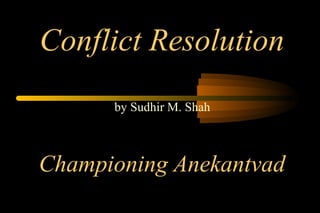Conflict resolution application of anekantvad
- 1. Conflict Resolution Championing Anekantvad by Sudhir M. Shah
- 2. Conflict ŌĆó Friction, disagreement, or discord arising within a group when the beliefs or actions of one or more members of the group are either resisted by or unacceptable to one or more members of another group. ŌĆó A serious disagreement or argument, typically a protracted one.
- 4. Main Cause of Conflicts ŌĆó Lack of respect ŌĆó Lack of trust ŌĆó Struggle for power, property etcŌĆ”
- 5. Religion ŌĆō Uniting or dividing? ŌĆó Religion, as the most powerful of cultural expressions, has also been the greatest source of conflicts around the world. If it continues to be a source of disharmony among human beings, the planet would certainly be better off without it.
- 6. ŌĆ£I do not want people to just tolerate each other, I want them to understand and respect each otherŌĆØ
- 7. Respect ŌĆó A respectful attitude acknowledges other personŌĆÖs rights, wishes and needs ŌĆó It yields to anotherŌĆÖs wishes and needs, not out of fear or pity, but through acknowledging their validity. ŌĆó Respect acknowledges the value and importance of who a person is, as well as their needs. ŌĆó Respect is the attitude that motivates one to truly serve another because he or she deserves it.
- 8. Mahavir (599-527 b.c.) Authoritative Absolutism Dogma Blind Faith The most revolutionary and radical thinkers of all times
- 9. Accept The Challenge ŌĆó Mahavir challenges us to discipline ourselves, to bring out the inherent qualities of our soul. To be fearless and free from dogma, superstitions and ceremonies. ŌĆó Instead of accepting this challenge, we sometimes get tangled up in ritualistic activities and gross codes of conduct.
- 10. An alternate epistemology ŌĆó A theory of knowledge that can support dialogue and negotiation among people of diverse perspectives and claims.
- 12. What is Anekantvad? An(non) ek(one) ant(end) v├żd(ness) ŌĆóSimply put, avoiding a single absolute conclusion or non-absolute thinking ŌĆóIt is a doctrine of multifacetedness of reality
- 13. What is Anekantvad? ŌĆóEmphasizing the limits of ordinary knowledge, Jain philosophy presents the theory that truth is relative to the perspective (naya) from which it is known.
- 14. What is Anekantvad? ŌĆó It is respect for the views of the other Thereby establishing a basis for reconciling conflicting ideological claims.
- 15. Anekantvad ( Non-absolutism) ŌĆó It leads to the acceptance of the fact that though I think my truth is right; I acknowledge that so might be yours. ŌĆó This is stepping back from the obduracy of ŌĆ£my truth, faith or religion is better than yoursŌĆØ.
- 16. Anekantvad ( Non-absolutism) ŌĆóAs a principle of non-dogmatism, Anekantvad rejects one-sided (ekantika) views ŌĆó Existence (soul) is permanent ŌĆó Existence is constantly changing
- 17. Anekantvad ( Non-absolutism) ŌĆóEpistemological respect for the view of others, however, is not relativism. ŌĆóIt does not mean conceding that all arguments and all view are equal. ŌĆóIt means that logic and evidence determine which views are workable; in what respect and to what extent.
- 18. Syadvad( Logic of Relativity) ŌĆóAll knowledge claims are only tentative ŌĆóŌĆ£X may be YŌĆØ or ŌĆ£X is Y under stated conditionsŌĆØ rather than ŌĆ£X IS YŌĆØ ŌĆóSimilarity with EinsteinŌĆÖs theory of Relativity
- 19. ŌĆ£To deny the co-existence of mutually conflicting viewpoints about a thing would mean to deny the true nature of realityŌĆØ Acharang Sutra
- 20. Project Anekant Conflict Resolution/Problem Solving Creating Mutual understanding & Respect Non-violent communication Training in listening without judgment Jain Unity ŌĆō Inclusiveness Training
- 25. Examples
- 26. All life is bound together by mutual support and interdependence ŌĆ£Parasparopgraho JivanamŌĆØ Ancient Jain scriptural aphorism
- 27. ŌĆ”WORDS Conflicts begin withŌĆ” ŌĆ”Thoughts Respectful Communication Training ŌĆ”Action
- 29. Practice in daily life!
- 30. DonŌĆÖt forget the BASICS






























